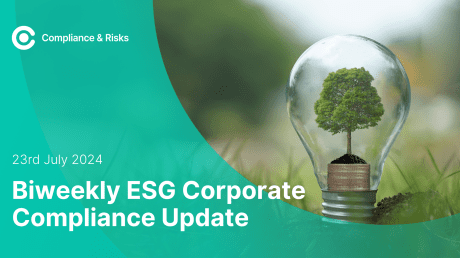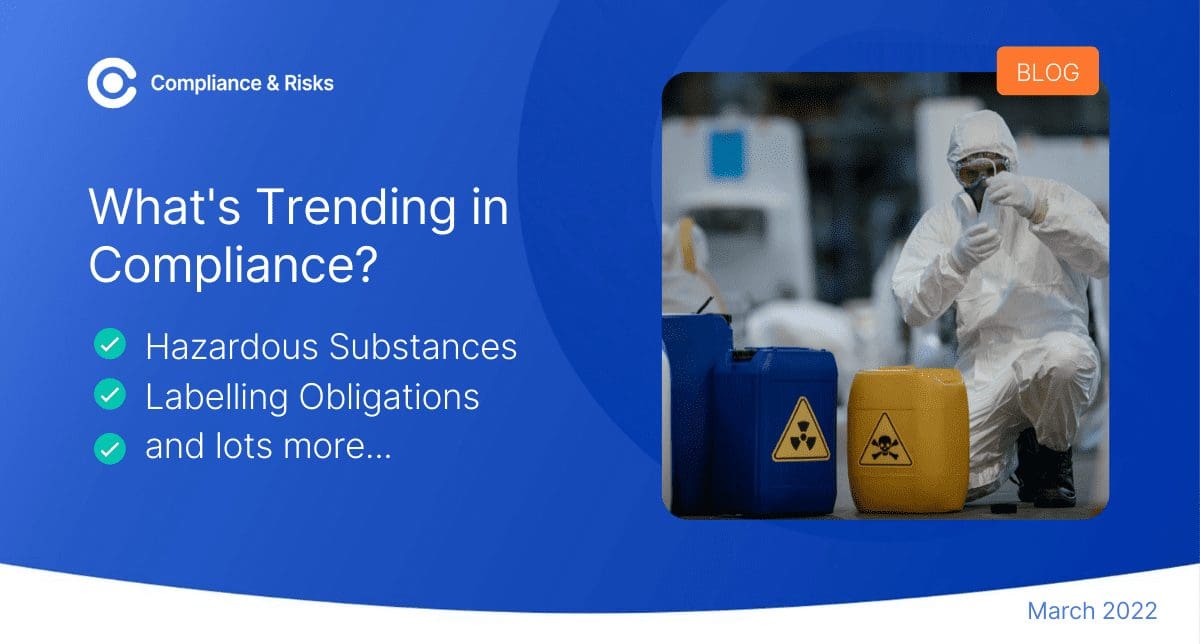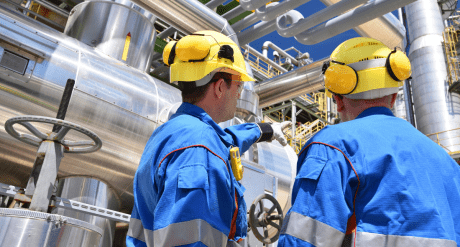
What’s Trending In Compliance? (March 2022)

At Compliance & Risks we help manufacturers, retailers and their supply chain partners to monitor and manage global regulations via C2P, our compliance knowledge management platform.
These are some of the top trending topics that generated the most interest in the last month.
1. Saudi Arabia: Restriction on the Use of Hazardous Substances in Electrical and Electronic Equipment, Guidance Document, 2022
This guidance document, issued by the Saudi Arabian Standards, Metrology and Quality Organisation (SASO), aims to clarify and detail the provisions of the Technical Regulation for Restriction of Hazardous Substances in Electrical and Electronic Appliances (i.e. Saudi Arabia RoHS).
The document includes the following sections:
- Preamble
- Timeline of the Technical Regulation for Restriction of Hazardous Substances in Electrical and Electronic appliances and Equipment Guideline
- Terms and Definitions
- Scope of the Technical Regulation for Restriction of Hazardous Substances in Electrical and Electronic Appliances and Equipment
- Exempted Products from the Application of the Technical Regulation for Restriction of Hazardous Substances in Electrical and Electronic Appliances and Equipment
- Definitions of Exempted Products from the Application of the Technical Regulation for Restriction of Hazardous Substances in Electrical and Electronic Appliances and Equipment
- Dates of the Mandatory Application for Product Categories Covered by the Scope of Technical Regulation
- Appendix (A) Products Covered in the Scope of Technical Regulation and HS Codes
- The Restricted Substances and the Maximum Permissible Concentration Values by Weight in Homogeneous Substances are Mentioned in Appendix 1-B of the Regulation
- Metrological Requirements
- Substances Exempted from the Application of Hazardous Materials Restrictions
- Registration in SABER Platform
- Conformity Assessment Procedure
- Flow Chart of the Conformity Assessment procedure
- Certificate of Conformity (COC)
- Shipment Certificate of Conformity (SC)
2. France: Obligation to Communicate Information on Substances in Articles to ECHA, Draft Decree, January 2022
Proposed on 21 January 2022 by the French Ministry of Ecological Transition, this Draft Decree provides for penalties related to the non-compliance with the obligation to communicate information on substances in articles to the European Chemicals Agency of information of certain chemical substances contained in products in accordance with Article 33 of Regulation (EC) No 1907/2006.
The draft also specifies the scope of the exemptions to this obligation. Pursuant to the last paragraph of Article L.521-5 of the French Environment Code, articles supplier within the meaning of the EU REACH may not have to communicate the information provided for in Article 33 (1) to ECHA, if the articles are related to:
- War materials and similar materials subject to prior export authorization;
- Defence-related products subject to prior transfer authorization as mentioned in the second paragraph of Article L. 2335-9 of the Defense Code;
- Items constituting dual-use goods covered by Annex I of Regulation (EU) 2021/821 setting up a Union regime for the control of exports, brokering, technical assistance, transit and transfer of dual-use items.
3. Italy: Postponement Of Packaging Labelling Obligations, Law No. 15/2022 “Milleproroghe” Decree
On 28 February 2022, Decree-Law No. 228/2021 was converted into Law by the Italian Parliament.
During conversion, the Parliament approved a further postponement of the environmental labelling obligations for packaging which will remain suspended until 31 December 2022 (instead of the previous 30 June 2022 as per Decree-Law No. 228/2021).
Also, products that do not meet the labelling requirements and have already been sold or labelled on 1 January 2023 (instead of the previous deadline of 1 July 2022 set out in Decree-Law No. 228/2021) may be sold until stocks last.
The deadline for the publication of the technical guidelines by the Ministry of Ecological Transition has also been postponed to 90 days (instead of 30 days) from the entry into force of the obligations.
4. Egypt: Special Conditions For The Importation Of Certain Commodities, Decision No. 991/2015 – Amendment – (on adding products in scope) Decision No. 96, 2022
On 22 February 2022, the Egyptian Ministry of Trade and Industry published Decision No. 96/2022 amending Decision No. 991/2015 on special conditions for the importation of certain commodities. Article 2 of the Amendment adds the following products and their customs codes to the list of products that can be imported under special conditions:
- current transformers (85.04),
- electronic locks (83.01.40),
- low pressure regulators for home use (90.32.20),
- manually operated LPG cylinder valve (84.81.30 – 84.81.40),
- low voltage cables (85.44),
- welding wires (83.11),
- fluorescent ballasts (85.04.10),
- energy saving lamps/bulbs (85.39.50),
- dry batteries (85.07),
- sealed batteries – emergency flashlight batteries – (85.06),
- golf batteries (85.07).
The decision enters into force on 22 May 2022, three months after publication in the Egyptian gazette.
5. New York (USA): Product Stewardship and Product Labelling, Regulations, 6 NYCRR Part 368, 2022
This rulemaking repeals and replaces the State’s existing Part 368 Recycling Emblems regulations and creates new Part 368 Product Stewardship and Product Labeling regulations, that will:
- modify the existing regulations for recycling labeling;
- develop new regulations for mercury-added consumer product labeling;
- develop new regulations for the registration and reporting of covered electronic equipment (CEE) manufacturers and collective electronic waste acceptance programs, as well as the operation of electronic waste acceptance programs; and
- includes requirements for the registration, collection, recycling, reuse, reporting, and closure (if applicable) of electronic waste recycling facilities, consolidation facilities, collection sites, collectors, and collection events. It also clarifies the requirements for retailers
This information is based on the most viewed regulations on C2P this month. If you would like to find out more about how you can stay on top of global regulations, why don’t you Book a Demo today?
Market Insights straight to your inbox
Join 30,000+ product compliance & market access experts around the world








